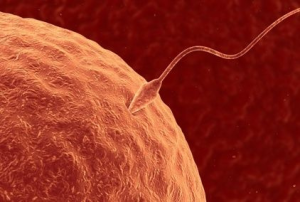Fertilization
 Overview
Overview
Both ancient and modern cultures have recognized the need to cleanse and ready the body prior to conception to ensure the optimum health of the sperm and egg—and to maximize the chances that an egg will be fertilized. A preconception checkup should include relating the personal and family medical history, present lifestyle, and an assessment of both partners' health. This typically will include a complete physical examination, screening for breast and cervical cancer and tests to detect sexually-transmitted diseases.
Detoxification
Both the would-be mother and father should adopt healthy lifestyle habits a year before the attempt is made to have a child. The mother should carefully avoid toxins that have been linked with both infertility and birth defects. She should consult a holistic gynecologist/obstetrician who will help her to develop a complete mind/body program for conception.
The gynecologist/obstetrician will also monitor the couple's exposure to:
- Alcohol, cigarettes, marijuana, cocaine, heroin, and LSD
- Medications such as lithium and tetracycline which have been linked to birth defects
- Pesticides, petroleum products, and heavy metals such as lead and mercury
- Over-the-counter medications such as aspirin, which can harm a fetus, and should be avoided throughout pregnancy
Nutrition
It is important for women who are planning to become pregnant to understand that the nutritional status of both partners prior to conception will affect the chances of her egg being fertilized by a healthy sperm. Both mother and father should work closely with the obstetrician to design a nutritional program that maximizes the mother's ability to conceive and deliver a healthy child.
The woman's diet prior to fertilization will also affect the development of the fetus once the mother becomes pregnant. Several famous studies of hospital births in Holland and Leningrad during World War II (where pregnant women were starving before or during their pregnancies), for example, showed that poor nutrition prior to pregnancy caused more birth defects and stillbirths than poor nutrition during pregnancy.
General guidelines for optimum nutrition should be started several months prior to conception and include:
- At least five daily servings of fresh fruits and vegetables, especially dark orange or green vegetables and citrus fruits
- At least six servings of whole grain breads and cereals each day
- Between 25 and 35 grams of fiber daily
- Limiting dietary fat intake to less than 30% of total calories, saturated fat to less than 10% , and cholesterol to less than 300 milligrams per day
Acupuncture
Acupuncture is the ancient Chinese technique of inserting tiny needles into the surface of the skin to stimulate the vital energy called "chi." Clinical trials have demonstrated that acupuncture can be even more effective in helping infertile women become pregnant than hormone injections.
Dr. I. Gerhard reports a fascinating study in the September 1992 issue of Gynecological Endocrinology in which researchers compared the effectiveness of auricular acupuncture and hormone treatments in stimulating ovulation in 45 infertile woman with hormone imbalances. Twenty-five of the women who were treated exclusively by acupuncture subsequently became pregnant. Fifteen additional women became pregnant after being treated with acupuncture that was combined with hormone therapy.
Tradional Chinese Medicine (TCM)
Chinese obstetricians have long believed that a couple should prepare six months to a year in advance of the time they wish to conceive. Several TCM protocols for fertilization have been developed by Dr. Maoshing Ni and colleagues at the University of Traditional Chinese Medicine in Santa Monica, California. The TCM program includes a vegetarian diet and herbal supplements which help the sperm fertilize the egg.
Some women cannot become pregnant because of obstructions in their fallopian tubes (the tubes through which the egg travels on its way from the ovary to the uterus). These women often have pelvic inflammatory disease (PID), which either inflames their tubes or forms scar tissue that blocks the egg's passage.
In some circumstances, a woman's fallopian tubes can be reopened by a surgical procedure called recanalization. However, after surgery the tubes frquently close up again. Western physicians typically use drugs such as Gentamyclin to keep the tubes open after recanalization, although drug treatments can have side effects such as stimulating extreme menstrual irregularities.
Small clinical trials suggest that Chinese botanical medicines can be as effective as drug therapy in keeping the tubes open following recanalization. In one study conducted at the Affiliated Hospital of Shandong College of Traditional Chinese Medicine, 50 women with fallopian tube obstructions were initially treated by catheter recanalization, and then divided into two groups. The Chinese Medicine Group (CMG) was treated with two Chinese botanical formulas: tongjingbao and Angelicae complex injection. The Western Medicine Group (WMG) was treated with the Western drugs Gentamyclin, Dexamethasone, and Chymotrypsin. All of the women in the CMG subsequently became pregnant, compared with 50% in WMG.
References
- Northrup,C.(2009). Women's bodies, women's wisdom : the complete guide to women's health and wellbeing. London : Piatkus
- Simkin, P. (2010). Pregnancy, childbirth, and the newborn : the complete guide. (4th ed.) New York: Meadowbrook Press
Posted in Fertilization
Ask a Question Or Join a Discussion


